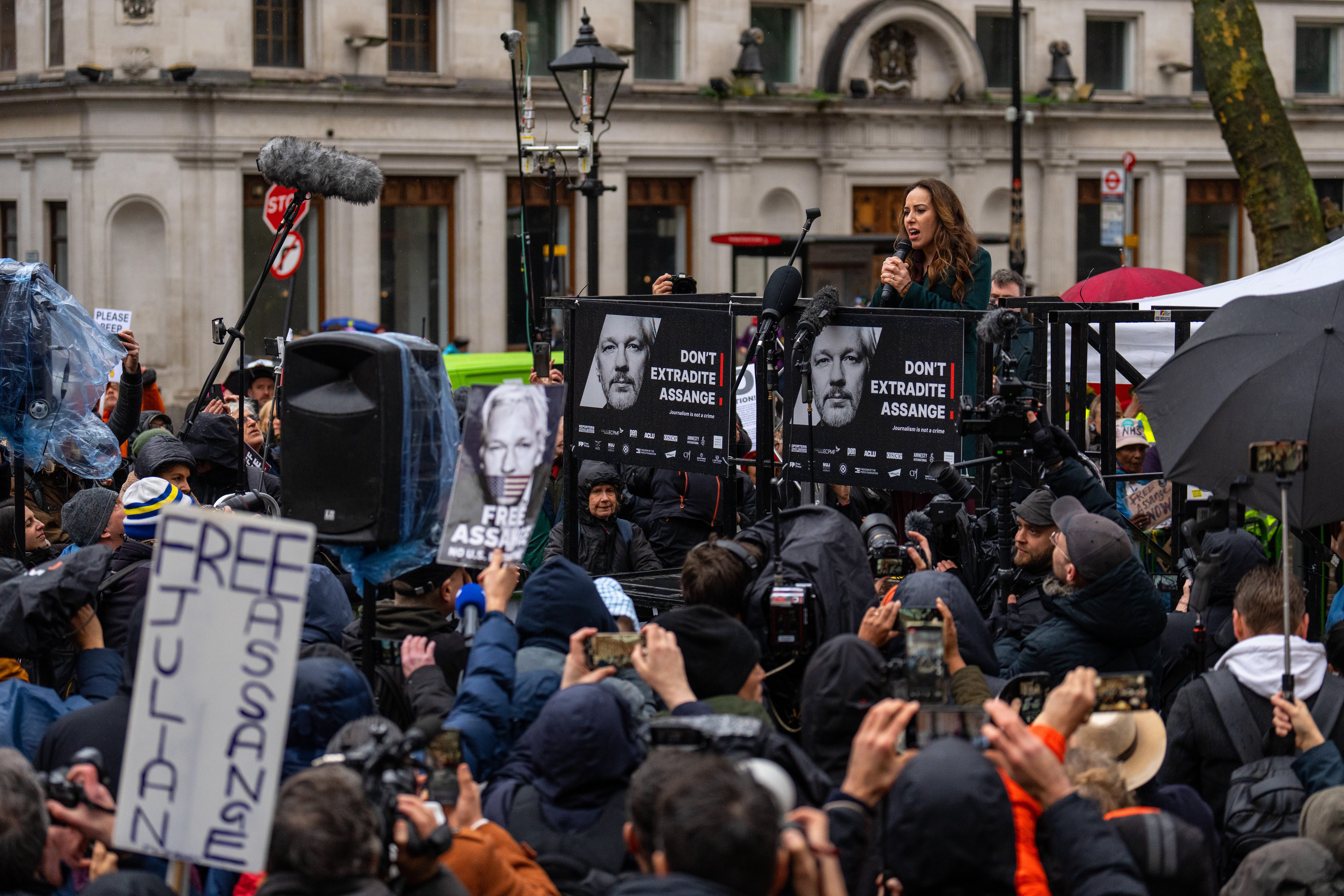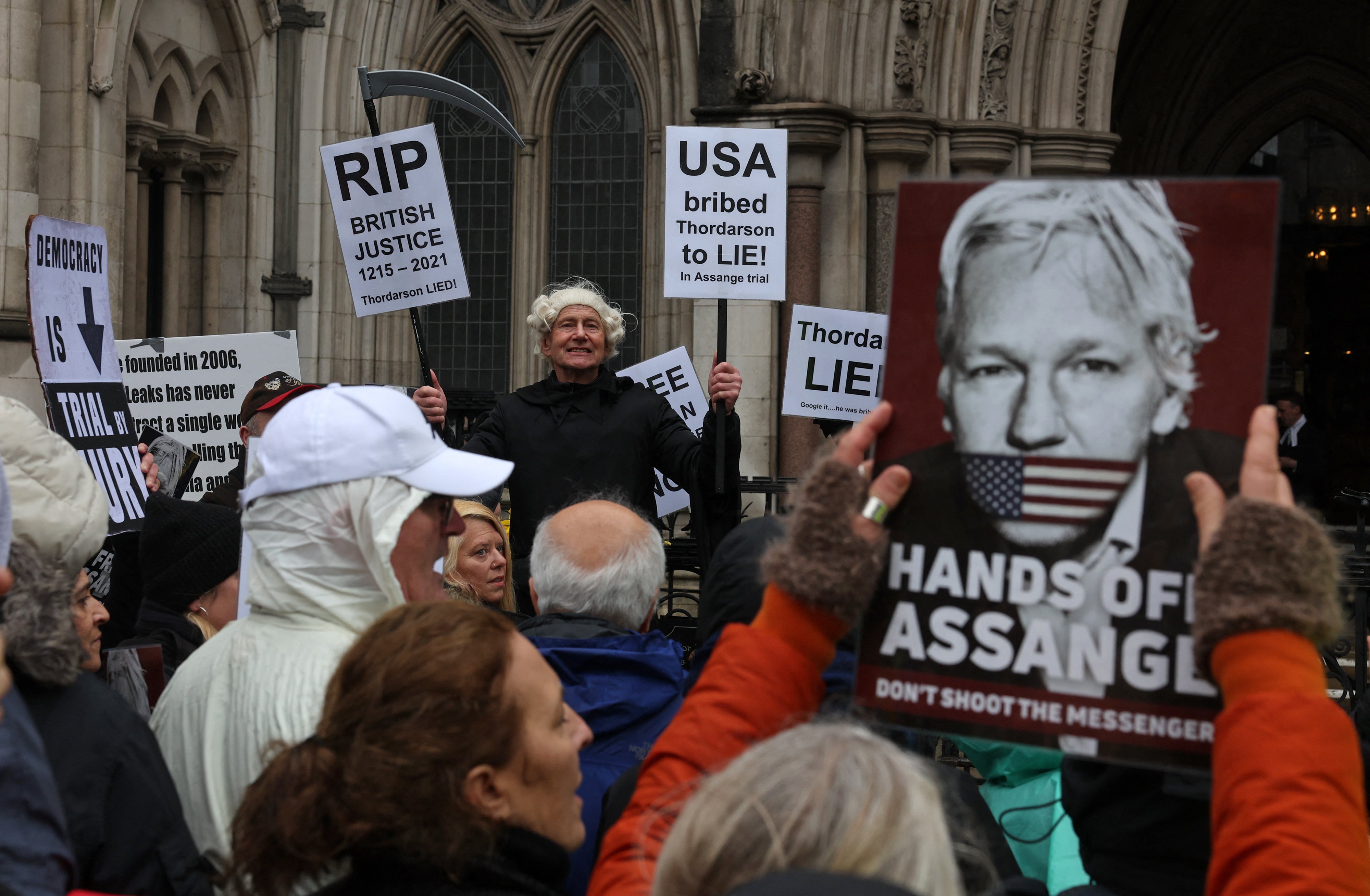Julian Assange ‘put lives at risk’ and should not be treated as journalist, US argues in extradition battle
The WikiLeaks founder put people at ‘grave and imminent risk’ by publishing the names of those who assisted the US, a court heard
Your support helps us to tell the story
From reproductive rights to climate change to Big Tech, The Independent is on the ground when the story is developing. Whether it's investigating the financials of Elon Musk's pro-Trump PAC or producing our latest documentary, 'The A Word', which shines a light on the American women fighting for reproductive rights, we know how important it is to parse out the facts from the messaging.
At such a critical moment in US history, we need reporters on the ground. Your donation allows us to keep sending journalists to speak to both sides of the story.
The Independent is trusted by Americans across the entire political spectrum. And unlike many other quality news outlets, we choose not to lock Americans out of our reporting and analysis with paywalls. We believe quality journalism should be available to everyone, paid for by those who can afford it.
Your support makes all the difference.Julian Assange put lives at imminent risk by publishing the names of those who helped the US in unredacted classified documents, a court was told on Wednesday as the WikiLeaks founder battles extradition.
Lawyers for the US insisted that the prosecution of Mr Assange, 52, was “based on law and evidence” and not his political opinions in the second day of a crunch High Court hearing.
The hearing is the latest in his five-year battle to fight extradition.
It is feared Mr Assange, 52, could be put on a flight to the US “within days” to face spying charges over the publication of hundreds of thousands of leaked documents relating to the Afghanistan and Iraq wars.
His team is seeking permission to appeal in a last-ditch bid to halt his extradition over fears he could face up to 175 years in prison if convicted for publishing the classified documents.
Hundreds of protesters braved wet weather to rally in support of Mr Assange on the final day of the two-day hearing on Wednesday, with judges set to deliver their ruling at a later date.
Supporters carrying banners and yellow ribbons gathered outside the Royal Courts of Justice in London, where crowds chanted “free, free Julian Assange” and “no extradition”.

It comes after his lawyers on Tuesday insisted his prosecution was “state retaliation” by the US and he is at risk of a “flagrant denial of justice” if he is extradited.
However, lawyers for the US told Dame Victoria Sharp and Mr Justice Johnson that the leaks were “one of the largest compromises of classified information in the history of the United States”.
Opposing Mr Assange’s bid for an appeal, they told the court his case is “unarguable” and should not be allowed to proceed to a full hearing.
Clair Dobbin KC told the court the US prosecution of Mr Assange was “based on law and evidence”, insisting that the WikiLeaks founder put people at “grave and imminent risk” by including the names of individuals who assisted the US in unredacted classified documents which he “indiscriminately and knowingly” published to the world.
“These were documents that disclosed to the world the unredacted names of human sources who had provided information to the US,” she said, adding that this separates Mr Assange from the New York Times and other news outlets which also published information exposed by WikiLeaks.
The court also heard that WikiLeaks and Mr Assange had explicitly solicited classified documents and sought to recruit and work with computer hackers to obtain information illegally.
“It is these facts that have led to his prosecution not his political opinions,” Ms Dobbin added.

She also urged the judges to consider the “fundamental assumption of good faith” on the part of states with which the UK has “long established extradition relations”.
“The US is one of the most long-standing partners of the UK,” she told the court.
She insisted that then-district judge Vanessa Baraitser, in her 2021 extradition ruling, had “rejected outright” that Mr Assange should treated as a journalist or someone akin to a journalist.
Joel Smith, also for the US, told the court that the potential sentence faced by Mr Assange in America is not “grossly disproportionate” and – even through a UK lens – the alleged offence is “grave and entirely unprecedented”.
He said the leaking of unredacted documents forced the setting up of a taskforce to protect those identified, while the global impact was felt not just in Afghanistan and Iraq, but also in China, Syria and Iran.
“That is a sweep of offending which is beyond the scope of anything criminal courts in this country have had to grapple with,” he added.

Although the WikiLeaks founder, who is being held in high security HMP Belmarsh in southeast London, was granted permission to attend court, he was too unwell to come.
Mark Summers KC, for Mr Assange, argued that even a sentence of 30 or 40 years imprisonment would amount to the “rest of his natural life” – adding that he had exposed “harm on titanic a scale”.
A group of around 20 protesters and environmentalists staged a sit-in inside the main hall of the Royal Courts of Justice after the two-day hearing for Mr Assange finished, with court staff removing them as the historic building was locked up for the night.
At a press conference last week, Mr Assange’s wife Stella warned the outcome of the appeal bid is life or death for her husband, who has deteriorated in prison where he spends 22-hours a day in confinement.
The Australian national has been in prison since he was removed from the Ecuadorian embassy in 2019.
Ms Assange, who met her husband while working as part of his legal team, said: “The situation is extremely grave. He could be on a plane within days.
“His health is in decline, mentally and physically. His life is at risk every single day he stays in prison, and if he’s extradited, he will die.
“But it’s not just about being extradited. Julian should never have been put in prison in the first place.”

Join our commenting forum
Join thought-provoking conversations, follow other Independent readers and see their replies
Comments